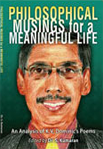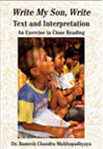Details of Critical study
My Review of Majumdar’s Trilogy
Year Of Publish:
Acceptance, Rejection, Compromise: Three One Act Play (Trilogy)
Acceptance, Rejection, Compromise: Three One Act Play (Trilogy) by Pronab Kumar Majumder. Kolkata: Bridge-in-Making Publication, 2009. 82 pp. Rs. 120. Soft cover.
Â
Pronab Kumar Majumder is a widely published and anthologized Indian English poet settled in Kolkata. He retired as a Special Secretary to the Government of West Bengal in 2001. He has been editing the international literary journal Bridge-in-Making since 1991. Majumder has published seven collections of poems in Bengali and twelve in English. Acceptance, Rejection, Compromise: Three One Act Play (Trilogy) is his maiden attempt at one act play.
This trilogy is written with a didactic purpose. As the title suggests each play imparts a noble value to the reader. For a successful life, for individuals as well as couples, these values of acceptance, rejection and compromise are essential. In this modern, materialistic world, there is little time for loving, caring or keeping a warm relationship, especially between husband and wife or between parents and children. The neglect or absence of love between husband and wife is the theme of this trilogy. In the struggle for existence, connubial bliss disappears, and gloom and darkness sneak the bedroom. Negligence, as we find in the plays, is never deliberate but circumstantial. Majumder here deals with the lives of metropolis. Both husband and wife have to earn to make ends meet. As government opportunities are less, they seek private employment, particularly in multinational firms. They have to dance to the tune of their employer and their survival in the firm depends on their performance. Moreover, the global recession and depression make their jobs insecure and they work every moment with the Sword of Damocles over their head.
“Acceptance†tells the discordant married life of Sumit and Sushmita. Sumit is a college lecturer working in a suburban college. Sushmita is a business postgraduate working for a multinational company in the metropolis. It is four years since they married but only once they had a short trip away. After their marriage they lived first in a small apartment. The busy and overwork in the company made Sushmita restless and she could not bear the addition of Sumit’s mother in the house. She was yearning for privacy and love from Sumit. The mother was sent to Sumit’s brother’s house.
Sumit took a larger apartment and a servant girl named Laxmi came to help them. The mother came back to their house and Sumit was happy that Sushmita finally accepted their mother. Sushmita often came late in the house after the busy schedule in the office. Exhausted she would dine and sleep neglecting her duty as a wife. Sumit also failed to serve his duties as a husband. Arka, Sushmita’s boss, took advantage of the situation and seduced her under the pretext of saving her from the termination from the company. She was repentant of the sin, but appeared happy to her husband and mother. Perfidious Arka, called Sushmita to his cabin after a few days and gave the termination letter. Sushmita, beaten and exhausted, was accepted warmly by Sumit and their mother. Sumit consoled her telling that she would get employment soon in some other company. They decided to shift to a smaller apartment. On the suggestion of Sushmita, they went on a tour to a sea-side resort. In the guesthouse, after their mother slept, Sushmita confessed to Sumit of her sin. She told him: “I am a sinner dear, I am pregnant. Yes, I am pregnant not by you. In our long years of marriage, we didn’t have a child. I wanted it. I don’t blame you. I blame myself for getting it by some other. Would you accept the child?†Sumit was spellbound. He could not believe it. He murmured, “Pregnant, pregnant you are. I failed, you got it done.†Sushmita implored him to accept them: “Yes, I am, that is the reality O dear. That is the reality. Please accept me, accept my child. Both of us appeal to your magnanimity.†The play ended, assuming that Sumit accepted her and her child.
“Rejection†tells the story of Dr. Pritam Basu and his wife, Shreya. They live with their father Prof. Somen Basu. Pritam is a very busy doctor who has devoted his life for the patients. Often he comes very late to his house. Shreya aged thirty, works in a multinational software company. She is the Project Manager. Pritam and Shreya have no child—in fact they find no time to give birth to a child. Pritam’s neglect of his wife irritates her and he feels guilty of it. He tries his best but cannot be truthful to his duty as a husband. His father also advises him several times to find time to spend some moments with her. Pritam fails miserably.
Ashok Srivastava, the Senior Vice President of Shreya’s company, was a very loving and caring officer to his staff. He invited Shreya one day for a visit to his house. His wife, very beautiful and young woman, was a handicapped and in crutches. They welcomed Shreya and drank tea with her. When Shreya reached home late in the evening Pritam was there and he taunted her with bitter remarks. Their father interfered in the conversation and the ice was broken. Ashok got transfer order to go to Bangalore. It was a shock to all employees, particularly to Shreya. Shreya was asked for a tea in Ashok’s house. He was alone there. His wife and daughter had already shifted to a house in Bangalore. Shreya became very emotional and wanted to have a memento of love from Ashok. But Ashok controlled his emotion and said, “My good girl, you are too good. I have accepted you. Love, if really it is, knows no “Rejection.†True love accepts, never rejects, even in a crisis. Stay fine, we shall have better time to be with. I leave my heart and thought for you.†Shreya wanted to give a farewell dinner on the rooftop of her house. Ashok was willing. The farewell party at the rooftop was attended by all the colleagues of Shreya’s office. But all were discontent as Pritam was not present. Dr. Pritam came very late for the party, only when others were leaving. He was very apologetic. Pritam and Shreya were alone in their bedroom. He explained again why he had been late. He asked her to forgive him. She replied that his negligence amounted to silent rejection, which she could not bear. Hence she decided to reject him, not physically, but mentally. “Some day you may feel the pain of being rejected. For me also it is painful to reject,†she cried. The play ended.
In “Compromise†we learn the disharmonious lives of Kaushik Basu, a marketing manager of a multinational company and his wife, Shweta, a journalist. The problem arises due to the busy schedule of their life. Kaushik goes to his office at 9 am and returns at 8 pm. Shweta goes to her office at 4 pm and returns at midnight. They have no child and live with Kaushik’s mother. Kaushik suspects Shanka, another journalist in Shweta’s office who drops her at house everyday. Shanka is single and handsome. Kaushik often taunts Shanka when he is found in his house taking tea with Shweta. In fact the relation between Shweta and Shanka has not gone beyond the limit of friendship. Kaushik’s mother’s words also add to his suspicion.
The C. E. O. of Kaushik’s office has noted that Kaushik is not smart at his work and there is some problem worrying him. He calls Kaushik to his cabin and enquires it. The C. E. O. advises him to consult a psychologist. Kaushik meets the psychologist named Kurnal Sen Gupta. Gupta studies the case and wants a consultation with Mrs. Kaushik. She also appears before the psychologist another day. The psychologist learns matters from her and requests both the husband and the wife to meet him another day. They come to him accordingly and Gupta teaches them the necessity of compromise in their lives.
Gupta told them, “I would suggest Mr. Basu to make acceptance of whatever happened making you suspicious, distrustful. And I would suggest Mrs. Basu to reject repetition of what you considered not should have been done. That will bring great COMPROMISE.†He asked them to meet him a year after. Accordingly they visited him a year after with their new-born child. They had had a very happy compromising life and had time to give birth to a child. Before parting Gupta told them, “. . . And that is life, always something we accept, something we reject and strike a compromise to live a life. Acceptance, Rejection, Compromise are the wheels on which life move on.†The play ended.





